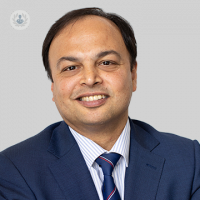Fibroids: Do they affect fertility or pregnancy?
Written by:Fibroids are the localised condensed thickening of the muscles (wall) of the womb (uterus). They start within the muscle of the womb but as they evolve, they may grow outside the wall and cause discomfort by virtue of their size, or from the pressure on the bladder in the front, or the bowel in the back. This leads to an increase in the frequency of passing urine, UTIs or constipation.
They may also grow into the cavity of the womb, causing heavy and irregular periods and bleeding, or difficulty in conceiving (fertility problems). Fibroids are the most common tumours in women. Up to 70 per cent of women have them, though in 90 per cent they may not cause any symptoms. Black and South Asian women are more prone to developing fibroids.
Leading gynaecologist and fertility consultant Mr Parijat Bhattacharjee explains how fibroids affect a woman's ability to conceive or if they have any effect throughout different stages of pregnancy.

Can fibroids affect fertility?
Fibroids may affect fertility depending on their location and size. Fibroids that protrude inside the cavity of the womb affect fertility and need to be removed usually through hysteroscopy (from below, without a cut on the tummy, and as a day case procedure). If they are not distorting the cavity, they may affect fertility, particularly if they are close to the tubes. Fibroids over five centimetres in size are generally removed either by keyhole or open surgery to improve fertility.
Can fibroids affect stages of pregnancy?
Fibroids are hormone-dependent growths and generally grow in size in pregnancy. However, mostly they do not cause any problems unless they are big (generally over 5 centimetres) when they may degenerate and cause pain. Pain killers are all that is needed, once other causes of pain are excluded.
If fibroids are in the lower part of the womb, they may prevent the baby’s head from coming down and increases the possibility of a caesarean section. There is a slightly higher risk of bleeding after delivery, in the presence of fibroids. Rarely, fibroids that grow outside the womb may grow a stalk and twist on itself causing intense pain and sometimes require surgery to remove them.
What does fibroid pain feel like during pregnancy?
Fibroid pain generally is a dull aching type. However, it can be intense, generally constant (not period-like). The pain may be severe enough to need hospital admission for strong pain killers. It is self-limiting, i.e. settles with pain killers.
Can they be removed during pregnancy?
Fibroids are best left alone in pregnancy. Apart from the risks to the baby due to surgery and anaesthesia, there's increased risk of bleeding and anaesthetic risks for the mother. Surgery is best done after the pregnancy (or before pregnancy, if fertility is affected).
Can fibroids disappear without treatment?
Fibroids are dependent on hormones in order to grow, so after menopause, they shrink and may disappear. Most fibroids do not need treatment since they rarely become cancer and often do not cause problems. If they do, they can be removed by keyhole or open surgery (depending on their location, size and number) or treated by uterine artery embolization (by blocking the main blood vessel of the womb, starving them of blood and nutrition).
If you would like expert fibroid treatment, and you're in London, Essex, Elstree or Watford, arrange a consultation with Mr Bhattacharjee via his Top Doctors profile


